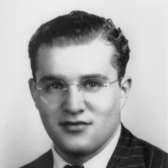
-
Learn More about Michel
- Collections View Michel's family papers
- Echoes of Memory Read Michel's writings
- First Person Watch Michel share his Holocaust experiences at a First Person program
- Oral History Access Michel's Oral Testimony
Michel’s parents were Russian-born Jews. His father had been a police official in Russia who had been deported to Siberia for being an outspoken Zionist. After escaping, he and his wife had made their way to Belgium, and two of their four children, including Michel, were born in Brussels.
1933-39: In Brussels my father owned and edited two newspapers, one French and one Yiddish. As a kid, I enjoyed reading comics like “Yordi,” who in the United States is known as Superman. A day after my eleventh birthday in 1939, I was shopping with my mother when church bells rang out, announcing that France and England had declared war on Germany because the Germans had invaded Poland.
1940-43: Four days after the Germans invaded Belgium in 1940 we fled for the south of France, where we tried to find refuge. We ended up in a detention camp in France, where refugees were interned, and my parents decided to escape. Our first night there was our last, and after sneaking out we got on a train. Still in France, we arrived at a friend’s farm and there we hid for a whole year, until it became too dangerous to stay. We then made our way to Marseille, where we hoped to get exit visas and sail for the United States.
The Margosis family did not succeed in obtaining exit visas, and they escaped instead over the Pyrenees into Spain. From there, Michel was sent to the United States in 1943.
Why I Volunteer
Michel now spends his time as a volunteer for a variety of organizations including the United States Holocaust Memorial Museum in Washington, D.C., the National Parkinson Foundation and WETA (the local Public Broadcast System). His memories, he says, are his legacy. “As I have borne witness to the Holocaust,” he says, “it is up to you to ensure that it will be remembered.”



